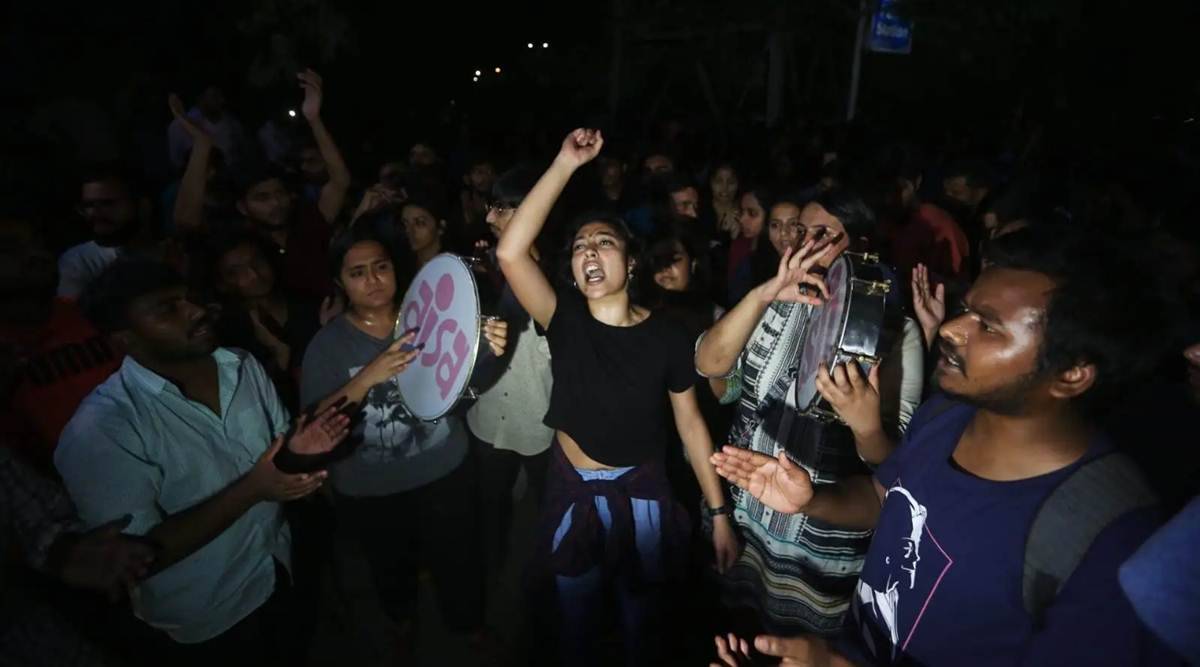 Most recently, a section of students allegedly attempted to stop the serving of meat at the Jawaharlal Nehru University’s Kaveri hostel mess. (File)
Most recently, a section of students allegedly attempted to stop the serving of meat at the Jawaharlal Nehru University’s Kaveri hostel mess. (File) Historically, there was no way Homo sapiens could have survived without meat. Not that they were aware of the need for proteins or the presence of these in meat, but apart from meat there was hardly anything available for sustenance. If at all they depended on any vegetation and/or fruits and berries that was available, then it was only as a supplement to the meat which dominated their diet.
Domestication of animals occurred very early in human history and nomadism, which was the norm then, was in no way a constraint in “carrying” animals wherever people went. Domestication of plants, which gradually led to cultivation and a “settled” form of life, happened relatively late. In cultivation, there was no guarantee that a particular crop will last till harvest time and yield the required food. There might be drought, floods, or pests that could render the entire task of cultivation a futile exercise (Even today there is no assured return from a crop in all places and in all contexts). Given that early humans did not depend on any organic or chemical fertilisers, cultivation was a highly uncertain indulgence; and after 90 to 120 days or more, the returns could, at best, be meagre or nothing at all. On the other hand, animal food was available in plenty and the person-hours spent in hunting, unlike in cultivation, were negligible considering how much meat could be obtained.
So, why would an individual or group of people spend long hours in cultivation and give up an easier way of life that provided plenty of food in the form of meat? Besides, with cultivation, humans became dependent on the whims of Mother Nature, which invariably made the vagaries of the weather descend on them. It is also significant that, universally, cave and rock paintings were made between 40,000 and 14,000 years ago, during the Upper Palaeolithic period. The domestication of plants happened only around 12,000 years ago. This suggests that before humans became cultivators, they had ample time on their hands to indulge in art, which is a leisure time activity, and remains so in the contemporary contexts too.
However, humans did go in for cultivation and settled life, and one of the necessary but not sufficient reasons could be the depletion of animal food. Yet, all through history, irrespective of the yield from cultivation, animal food has never been given up. When enough non-meat food was available, a few people either gave up meat or ate it sporadically, leading to the emergence of the term “vegetarian”, although there remained a humongous section that ate what by then had evolved as normalised food, that is, meat. For no apparent or logical reason, the vegetarians eventually bestowed the epithet “non-vegetarian”, with all its negative connotations, on the majority which had simply continued to do what it had been doing throughout human history: Eat meat.
Take any part of the world and it is evident that the population of vegetarians has always been in a minority, if not minuscule in scale. In spite of the widespread belief that Indians are primarily vegetarian (and hence “non-violent”, as is often argued by some sections), the truth is the reverse. A majority is, in fact, predominantly meat-eating: As per the 4th National Family Health Survey, 70 per cent of women and 78 per cent of men in India consume some form of meat. That, in plain terms, means that a majority of Hindus are not vegetarians.
Given the above, why have there been frequent squabbles and skirmishes revolving around and involving meat in India, particularly since 2014? Most recently, a section of students allegedly attempted to stop the serving of meat at the Jawaharlal Nehru University’s Kaveri hostel mess. As per reports, the police has registered an FIR against “several unidentified students affiliated with the Akhil Bharatiya Vidyarthi Parishad (ABVP) a day after multiple students were injured after violence broke out on the JNU campus”.
Is it the meat per se which generates such anger? Not by any stretch, as much of the ire that is directed against meat-eating seems to be aimed mostly against Muslims, although Dalits, Christians, and almost all the tribal communities, along with a host of other communities consume meat in India. In the politics of meat, the Muslim identity is reduced to a singular facet, that of meat-eating.
These disturbing happenings (including lynchings) have consistently had a highly negative impact on the very fabric of multiculturalism and secularism in the country. They are obstacles on the path of pluralism which should be the goal of any democratic and progressive country.
Incidentally, almost nowhere else in the world do people ask you if you are a “non-vegetarian”. The usual question is whether one is a vegetarian or — the fast-growing sobriquet — vegan. This is because everywhere those who have given up eating meat are called vegetarians, while the rest are just eating normal food.
The writer, a social anthropologist, is Visiting Professor, Centre for Economic and Social Studies, Hyderabad. Views are personal
- The Indian Express website has been rated GREEN for its credibility and trustworthiness by Newsguard, a global service that rates news sources for their journalistic standards.

